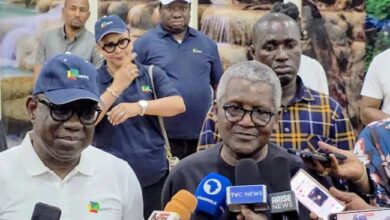Abia Govt. revokes ENASCO land title, moves to recover ‘mismanaged’ shoe factory

In a move signaling a tough stance on public asset mismanagement, the Abia State Government (ABSG) has revoked the land title of the Enyimba Automated Shoe Company (ENASCO), citing grave corporate governance failures, financial opacity, and an alleged attempt to sideline the government’s ownership stake in the firm.
The announcement, made on Friday by Mr. Ukoha Njoku, Chief Press Secretary to Governor Alex Otti, followed what he described as a “comprehensive operational and financial review” conducted by top-tier global auditing and advisory firms—commonly referred to as the Big Four.
“The findings revealed significant discrepancies and a calculated effort to strip the government of its rightful stake in ENASCO,” Ukoha stated.
A Dream Factory Now in Dispute
ENASCO, launched in 2020 under former Governor Okezie Ikpeazu, was initially positioned as a flagship industrialisation project aimed at scaling up Aba’s legendary shoe craftsmanship into an automated, export-ready enterprise. The factory, equipped with machinery from Turkey and a projected 2 million-pairs-per-year capacity, was envisioned as a game-changer for Nigeria’s leather and footwear industry.
However, the latest revelations paint a starkly different picture. According to Ukoha, public contributions totaling over ₦200 million—in assets and cash—account for more than 70% of the company’s founding resources. Yet, a review of ENASCO’s shareholding structure as of April 2025 shows zero state ownership.
Instead, private individuals—Nwakile John Chidi, Udeagbala John Chinyelu, Nwaogu Chinenye, Sam Hart, and Macauley Atasie—appear as the only registered shareholders with significant equity stakes.
“This is not just a case of poor governance. It is an audacious misappropriation of public assets,” Ukoha added, stressing that ABSG had neither board representation nor dividend accountability.
Red Flags: Losses, Unverifiable Spending, and Governance Gaps
A financial audit of the firm revealed accumulated retained losses of ₦115.7 million in ENASCO by October 2024, along with unverified expenditures from shareholder deposits totaling ₦97.7 million. Operational revenue had also consistently declined, suggesting weak management oversight and strategic drift.
Further, the company reportedly operated without a functioning Board Charter, had no statutory audits, and defaulted on several tax obligations—all violations of corporate governance best practices.
“ENASCO’s management structure, or lack thereof, raises questions about the motive and capacity of those entrusted with managing a venture so heavily funded by public resources,” Ukoha stated.
Negotiations Collapsed, Legal Action Looms
Efforts to address the governance crisis via a stakeholders’ meeting on April 23 were reportedly stonewalled. According to the government, private shareholders resisted all calls to restructure the equity ownership to reflect ABSG’s investment, and refused the appointment of government-nominated directors to the board.
Describing this posture as “untenable and absurd,” Ukoha disclosed that ABSG has initiated legal steps to recover additional funds and assets misappropriated under the current management of ENASCO. The land title revocation, he added, was a first step toward reclaiming public investment and restoring order to the project.
“We will not stand by while public investments are converted to private fiefdoms,” he said. “This government is committed to transparency, accountability, and credible partnerships that respect the rule of law.”
BRANDECONOMY ANALYSIS: A Microcosm of Nigeria’s Industrialisation Challenges
The ENASCO saga underscores a recurring theme in Nigeria’s industrialisation story: the mismatch between vision and execution. While the idea behind ENASCO remains relevant—modernising a traditional value chain like Aba’s footwear industry—the lack of governance, transparency, and political continuity has once again derailed what could have become a model for MSME-led industrial clusters.
ENASCO’s fall from grace also exposes deep structural flaws in Nigeria’s approach to public-private partnerships (PPPs), where public funding often lacks protection mechanisms and political transitions become flashpoints for asset disputes.
With Aba long hailed as Nigeria’s “Japan of Africa” due to its manufacturing ingenuity, Governor Otti’s move may be the reset button needed to restore investor confidence and safeguard the integrity of industrial policy in the state.
Editorial Insight:
As states chase industrialisation, the ENASCO case offers a cautionary tale: equity without accountability is a ticking time bomb. If public-private partnerships are to succeed in Nigeria, robust legal safeguards, enforceable governance structures, and transparent monitoring frameworks must be non-negotiable. For Governor Otti, the bigger challenge now is ensuring that future ventures don’t repeat this avoidable failure.












